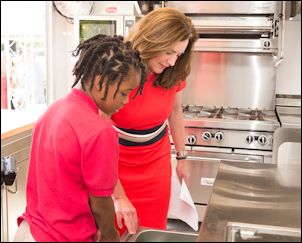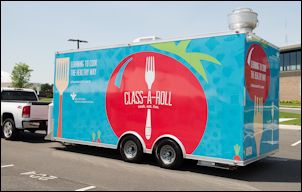by James A. Bacon
The East End of Richmond is a notorious food desert where thousands of low-income residents don’t have ready access to healthy food. Richmonders have responded in a number of ways, most visibly by encouraging the cultivation of gardens in empty lots and back yards and by working with local convenience markets to sell fresh vegetables along with the junk food that fills their shelves. But all the good intentions have foundered on a basic problem: Inner city residents have lost the taste for kale, spinach and zucchini. Not only that, they have lost the cultural knowledge of how to cook the vegetables.
Bon Secours, which runs a community hospital in the East End and has committed to improving community health, has decided to tackle the problem of poor nutrition head on. Yesterday the health organization unveiled a mobile kitchen, the Class-A-Roll, that it will use for cooking classes and demonstrations. States a press release:
Class-A-Roll will target parents between the ages of 18 and 35, as well as children aged 12 and under. … Class-A-Roll will assist parents and children with the skills and knowledge to make healthy choices with regards to the food they purchase and how they prepare it.

First Lady Dorothy McAulliffe and a student from St. Andrew’s School check out the Class-A-Roll kitchen.
Volunteer nutritionists, culinary students and others will man the kitchen on wheels. Bon Secours is partnering with various community organizations to line up events in Church Hill and the East End. The program goal is to influence a 10% increase in fruit and vegetable consumption by improving access to neighborhood food markets, thus contributing to a drop in obesity rates.
Bacon’s bottom line: Bon Secours has the right idea. Do-gooders can ply people with all the healthy food in the world, but if the poor people don’t like the food and don’t know how to cook it, they won’t eat it. That problem is not unique to poor people, by the way. My wife and I have tried unsuccessfully for years, using every means from meting out old-fashioned punishments (you can’t leave the table until you finish your broccoli) to bribery (eat those brussel sprouts and you’ll get ice cream for desert), giving lectures on health and nutrition to pleading on our hands and knees, but we haven’t made a dent in the atrocious eating habits of my 15-year-old son. Given the futility of altering the nutritional intake of a lad whose life we exercise a large measure of control, I can’t imagine that watching an occasional demonstration of the Class-A-Roll will alter the behavior of inner-city kids addicted to a lifetime of eating salt, sugar and fat.
But, hey, you don’t know until you try. And the effort could be worth it if it saves only a handful of poor kids from a future of obesity and diabetes.
(Full disclosure: Bon Secours is former sponsor of Bacon’s Rebellion coverage of community health issues.)



